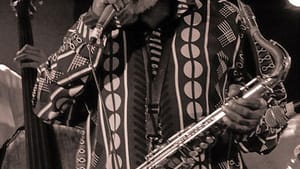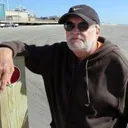Stay in the Loop
BSR publishes on a weekly schedule, with an email newsletter every Wednesday and Thursday morning. There’s no paywall, and subscribing is always free.
Pharoah, Freda, and me

Back in my hurly-burly hippie days, I had the food concession at the Keystone Korner, a jazz club in North Beach in flower-haired San Francisco.
We couldn't serve food during the sets, so I heard a lot of great jazz and got to meet a lot of legendary players like Miles Davis, Chick Corea, Philly's Stanley Clarke, Bobby Hutcherson, Donald Byrd (who passed recently), Tony Williams, Rahsaan Roland Kirk, and James Moody. Miles could be touchy, putting it charitably, but most everybody else was either as sweet as the Muslim bean pie I served or at least polite and civil.
My two favorites were saxophonists James Moody and Rahsaan Roland Kirk. Moody was just a peach; when I told him that I was from Philly, too, he asked me why I thought he was from Philly. I said because of his song “Last Train from Overbrook.” He laughed and told me that the Overbrook in the song was the name of an alcohol dry-out hospital outside of London. When I told him that I thought “Moody's Mood for Love” was one of the purest jazz songs ever, he agreed. And laughed. James Moody was a truly nice man. I smile now, thinking of him.
I downright chuckle when I think of Rahsaan, the blind saxophonist, who played two horns at once and had considered an operation to make his mouth wide enough to play three. Rahsaan was all that is good about jazz. His wife, who was his manager, would lead him into the club every night and he'd make the rounds, giving big hellos and hugs to everybody who worked there. He called me “Food” and would yell, “Hey, Food, what's good tonight?” Rahsaan's signature song was “Bright Moments,” and he made every minute you were around him a bright one.
Then there was free style tenor man Pharoah Sanders. They called him “Rock,” and he was a law unto himself. There was a gravitas about him that bespoke deep and abiding wisdom — and the passion of his music.
Pharoah came in one night with the singer Freda Payne, who had the big hit “Band of Gold,” and this big guy who always wore a black suit and carried this oversized, biblical-looking book.
Freda stopped to get an avocado and sprouts sandwich — my specialty — and when I asked her for the money, she said, “Get it from the welfare” and walked off. I knew she wasn't doing so good then, and she was Freda Payne, after all, so I let it slide.
A lot of times, I'd go to this sort of green room downstairs and hang out with the act that was on next while the music was on upstairs, since we couldn't serve then. We'd smoke weed and talk music, mostly, and listen to the act upstairs, filtered softly through the floor.
This night, Pharoah, Freda, and the man in black were down there and we smoked some killer ganja and, after a while, Freda allowed how she shouldn't have been so rude when she stiffed me. She smiled at me, and all was forgiven.
When the Keystone closed, my waitress, Christina Midnight, and I went over to Freda's house with the three of them and we smoked some more weed and listened to music. Pharoah didn't say much, as usual, and the man in black just read in his book and toked when the joint was passed.
Finally, I asked him, “What's in that book?”
He passed it to me, and said in a voice so deep it seemed bottomless, “Think of a word. To yourself.”
“Okay.”
“Now open the book anywhere you want and start to read.”
I did and the third word I came to was my word: joy.
“Damn,” I said, looking up at him.
“That's what's in the book,” he said, and reached out for it.
Sign up for our newsletter
All of the week's new articles, all in one place. Sign up for the free weekly BSR newsletters, and don't miss a conversation.

 Bob Ingram
Bob Ingram